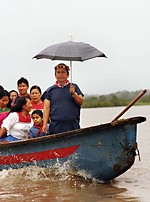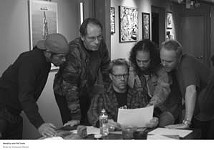Paradise Lost: The Child Murders of Robin Hood Hills
1996, NR, 135 min. Directed by Joe Berlinger, Bruce Sinofsky.
REVIEWED By Marjorie Baumgarten, Fri., Oct. 18, 1996
On May 5, 1993, the horribly mutilated and abused dead bodies of three eight-year-old boys -- Steven Branch, Christopher Byers, and Michael Moore -- were discovered by a shallow creek a short distance from the interstate in West Memphis, Arkansas. Not finding any immediate culprits, the community suspected satanic worshippers. Eighteen-year-old Damien Echols, whose name, personality, and black attire fit the bill; 17-year-old Jesse Misskelley, with an IQ of 72; and 16-year-old Jason Baldwin, a Metallica fan, were charged with the murders after Jesse confessed during police questioning. Although each entered a “not guilty” plea and no physical evidence was presented at the trial that might link the teens with the murders, each was convicted and sentenced to life imprisonment or death. That's the abbreviated version of events but it's hardly the whole story as the fascinating theatrical documentary Paradise Lost: The Child Murders at Robin Hood Hills reveals. So much more is simmering beneath the surface in West Memphis, Arkansas. In many respects, Paradise Lost is similar to an earlier documentary by filmmakers Joe Berlinger and Bruce Sinofsky, Brother's Keeper. There, too, they explore the ways in which a bizarre murder/death and its legal aftermath affect the residents of a small community. Over 150 hours of footage was shot over a nine-month period in order to be pared down to a two-and-a-half-hour documentary that, despite its length, is never less than absorbing. Interviewed are the family members of both the murdered boys and the defendants, whose commentary creates intimate portraits of people struggling on a biblical scale with issues of hate, revenge, and punishment. Hours of courtroom material were captured and, somehow, the filmmakers were also granted frequent access to discussions held in the judge's chambers. At one point, the filmmakers risk fouling the line between observer and participant when a gift received from a family member is turned over to the court as a potential piece of evidence. Robert Richman's sensitive camerawork penetrates the situation, creating a telling sociological portrait of a community. As viewers, the film also delivers on the level of sheer courtroom drama as basic questions of guilt and innocence constantly hang in the balance. Paradise Lost is a most intriguing work: part sociology, part legal study, and pure drama. (See related interview in this week's Screens section.)
A note to readers: Bold and uncensored, The Austin Chronicle has been Austin’s independent news source for over 40 years, expressing the community’s political and environmental concerns and supporting its active cultural scene. Now more than ever, we need your support to continue supplying Austin with independent, free press. If real news is important to you, please consider making a donation of $5, $10 or whatever you can afford, to help keep our journalism on stands.
Marjorie Baumgarten, Oct. 9, 2009
Marrit Ingman, Sept. 10, 2004
March 15, 2025
March 14, 2025
Paradise Lost: The Child Murders of Robin Hood Hills, Joe Berlinger, Bruce Sinofsky









